1
It is love, not reason, that is stronger than death.Thomas Mann
2
Nothing is more curious and awkward than the relationship of two people who only know each other with their eyes – who meet and observe each other daily, even hourly and who keep up the impression of disinterest either because of morals or because of a mental abnormality. Between them there is listlessness and pent-up curiosity, the hysteria of an unsatisfied, unnaturally suppressed need for communion and also a kind of tense respect. Because man loves and honors man as long as he is not able to judge him, and desire is a product of lacking knowledge.Thomas Mann
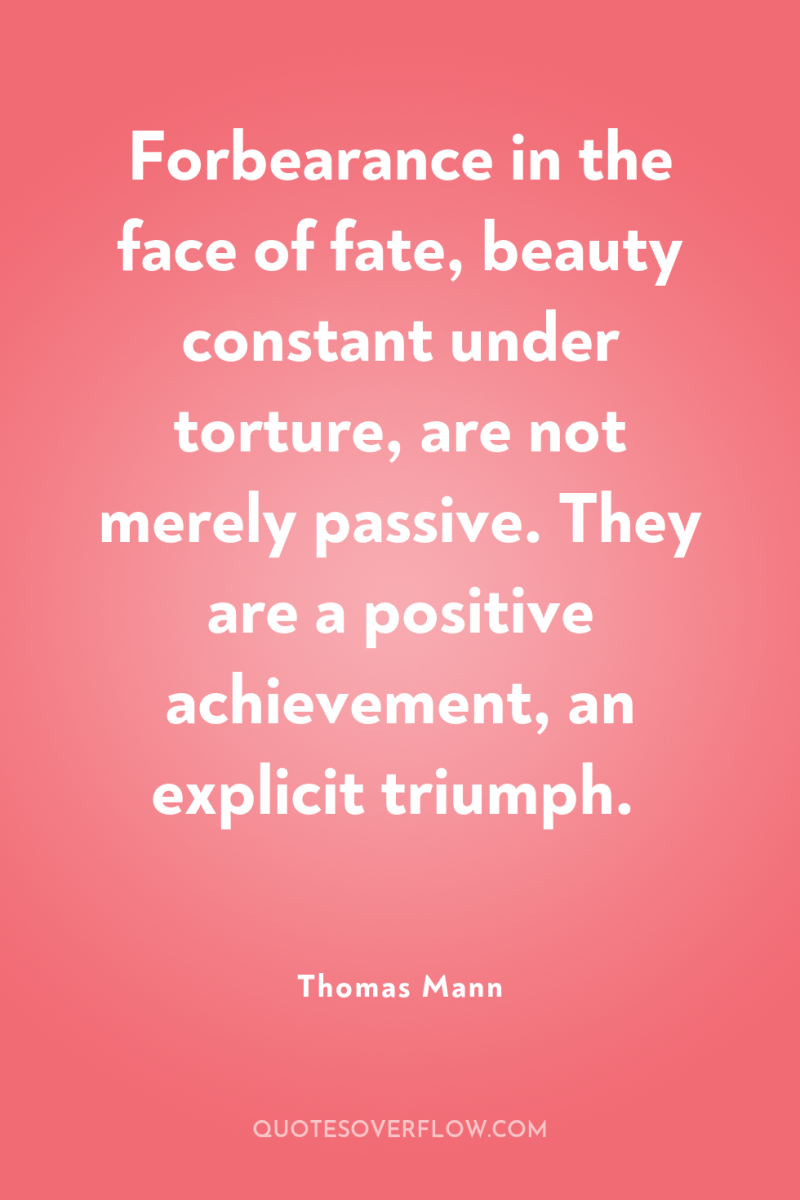
3
Forbearance in the face of fate, beauty constant under torture, are not merely passive. They are a positive achievement, an explicit triumph.Thomas Mann
4
Laughter is a sunbeam of the soul.Thomas Mann
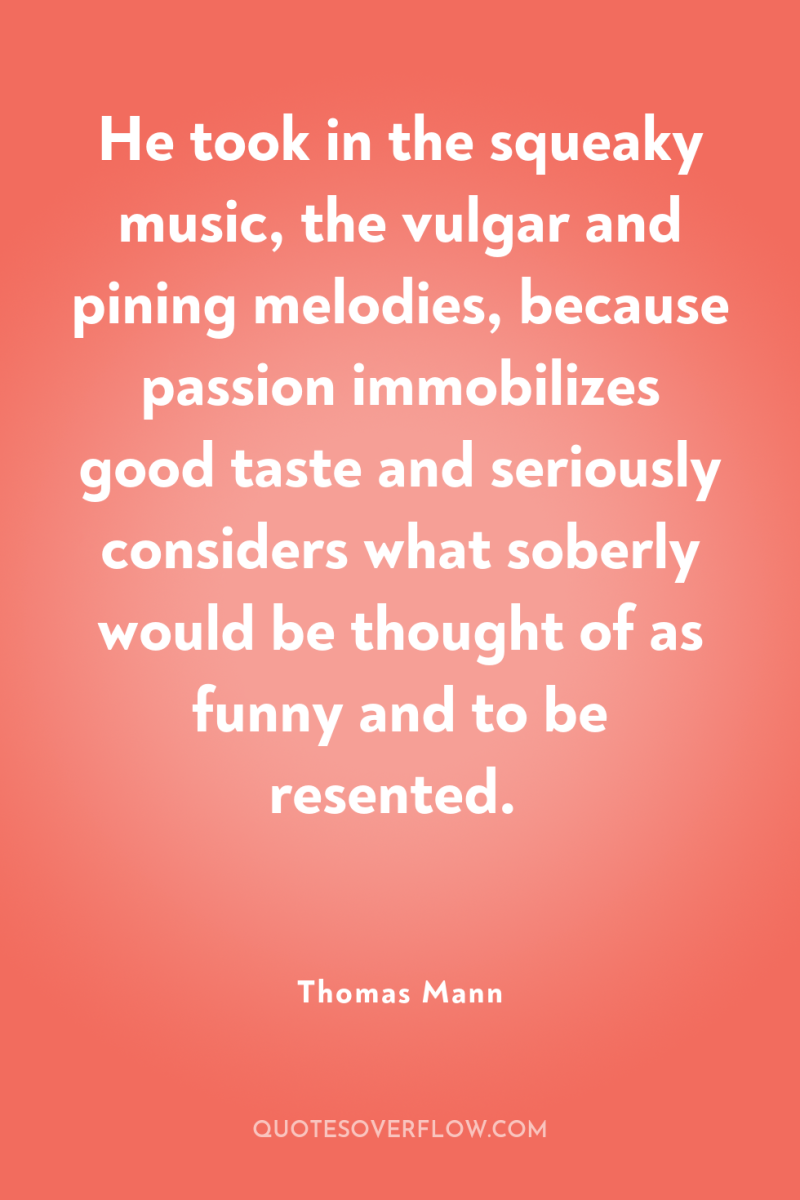
5
He took in the squeaky music, the vulgar and pining melodies, because passion immobilizes good taste and seriously considers what soberly would be thought of as funny and to be resented.Thomas Mann
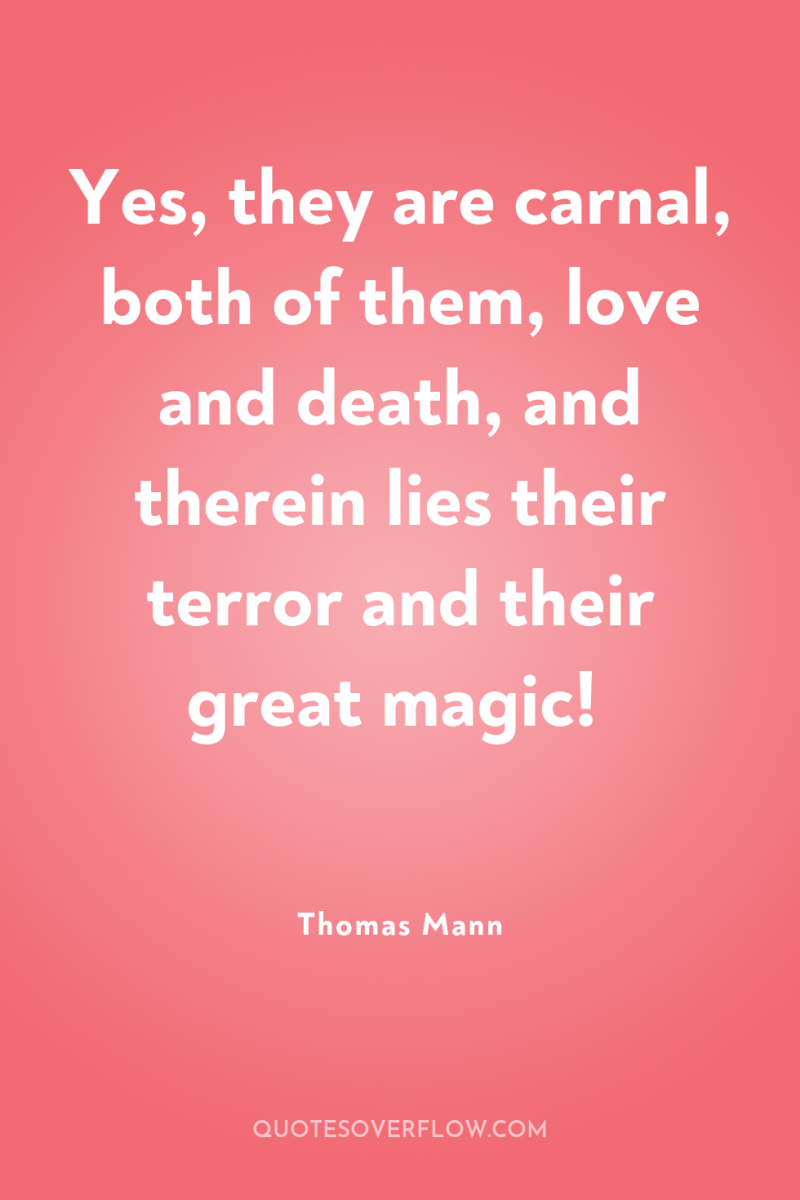
6
Yes, they are carnal, both of them, love and death, and therein lies their terror and their great magic!Thomas Mann
7
The Ladies Buddenbrook from Breite Strasse did not weep, however - it was not their custom. Their faces, a little less caustic than usual at least, expressed a gentle satisfaction at death's impartiality.Thomas Mann
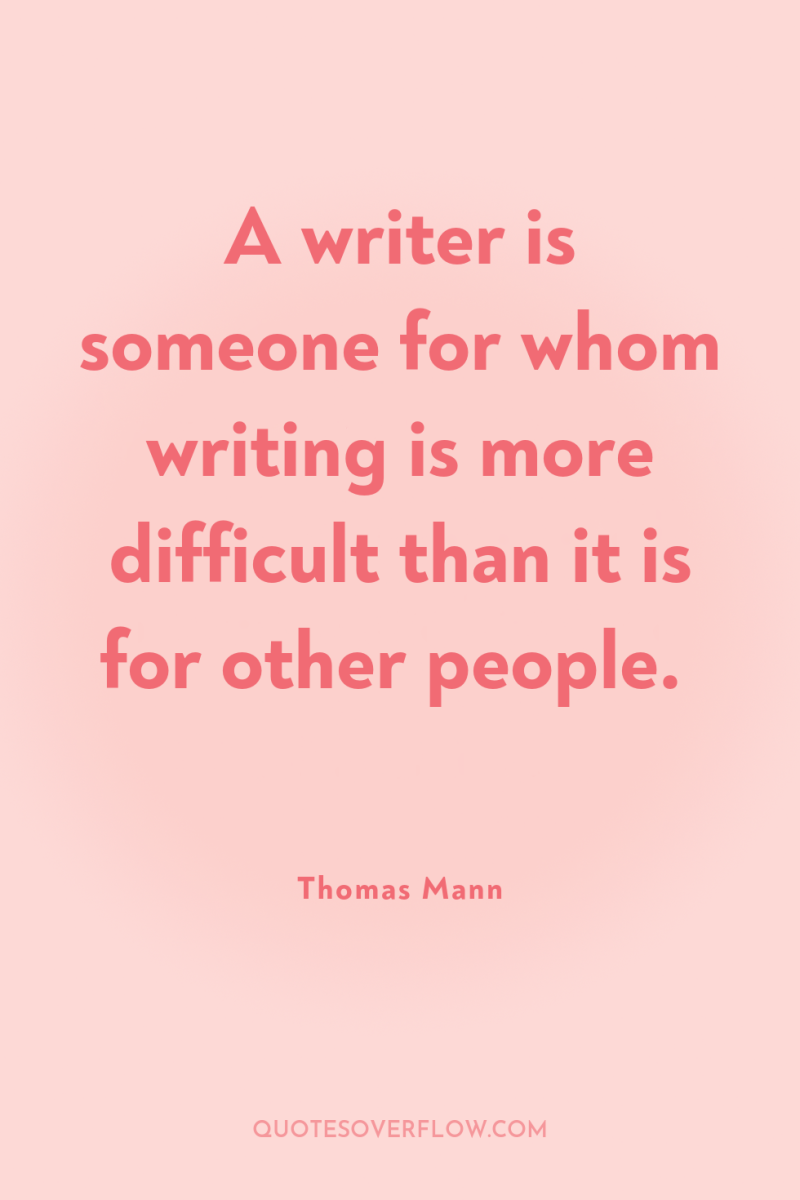
8
A writer is someone for whom writing is more difficult than it is for other people.Thomas Mann
9
Nothing is stranger or more ticklish than a relationship between people who know each other only by sight, who meet and observe each other daily - no hourly - and are nevertheless compelled to keep up the pose of an indifferent stranger, neither greeting nor addressing each other, whether out of etiquette or their own whim.Thomas Mann
10
No, not of course at all–it is really all hocus-pocus. The days lengthen in the winter-time, and when the longest comes, the twenty-first of June, the beginning of summer, they begin to go downhill again, toward winter. You call that ‘of course’; but if one once loses hold of the fact that it is of course, it is quite frightening, you feel like hanging on to something. It seems like a practical joke–that spring begins at the beginning of winter, and autumn at the beginning of summer. You feel you’re being fooled, led about in a circle, with your eye fixed on something that turns out to be a moving point. A moving point in a circle. For the circle consists of nothing but such transitional points without any extent whatever; the curvature is incommensurable, there is no duration of motion, and eternity turns out to be not ‘straight ahead’ but ‘merry-go-round’!.Thomas Mann
11
The diaries of opium-eaters record how, during the brief period of ecstasy, the drugged person's dreams have a temporal scope of ten, thirty, sometimes sixty years or even surpass all limits of man's ability to experience time--dreams, that is, whose imaginary time span vastly exceeds their actual duration and which are characterized by an incredible diminishment of the experience of time, with images thronging past so swiftly that, as one hashish-smoke puts it, the intoxicated user's brain seems "to have something removed, like the mainspring from a broken watch.Thomas Mann
12
And life? Life itself? Was it perhaps only an infection, a sickening of matter? Was that which one might call the original procreation of matter only a disease, a growth produced by morbid stimulation of the immaterial? The first step toward evil, toward desire and death, was taken precisely then, when there took place that first increase in the density of the spiritual, that pathologically luxuriant morbid growth, produced by the irritant of some unknown infiltration; this, in part pleasurable, in part a motion of self-defense, was the primeval stage of matter, the transition from the insubstantial to the substance. This was the Fall.Thomas Mann
13
Nature in her creative dreaming, dreamt the same thing both here and there, and if one spoke of imitation, then certainly it had to be reciprocal. Should one take the children of the soil as models because they possessed the depth of organic reality, whereas the ice flowers were mere external phenomena? But as phenomena, they were the result of an interplay of matter no less complex than that found in plants. If I understood our friendly host correctly, what concerned him was the unity of animate and so-called inanimate nature, the idea that we sin against the latter if the boundary we draw between the two spheres is too rigid, when in reality it is porous, since there is no elementary capability that is reserved exclusively for living creatures or that the biologist could not likewise study on inanimate models.Thomas Mann
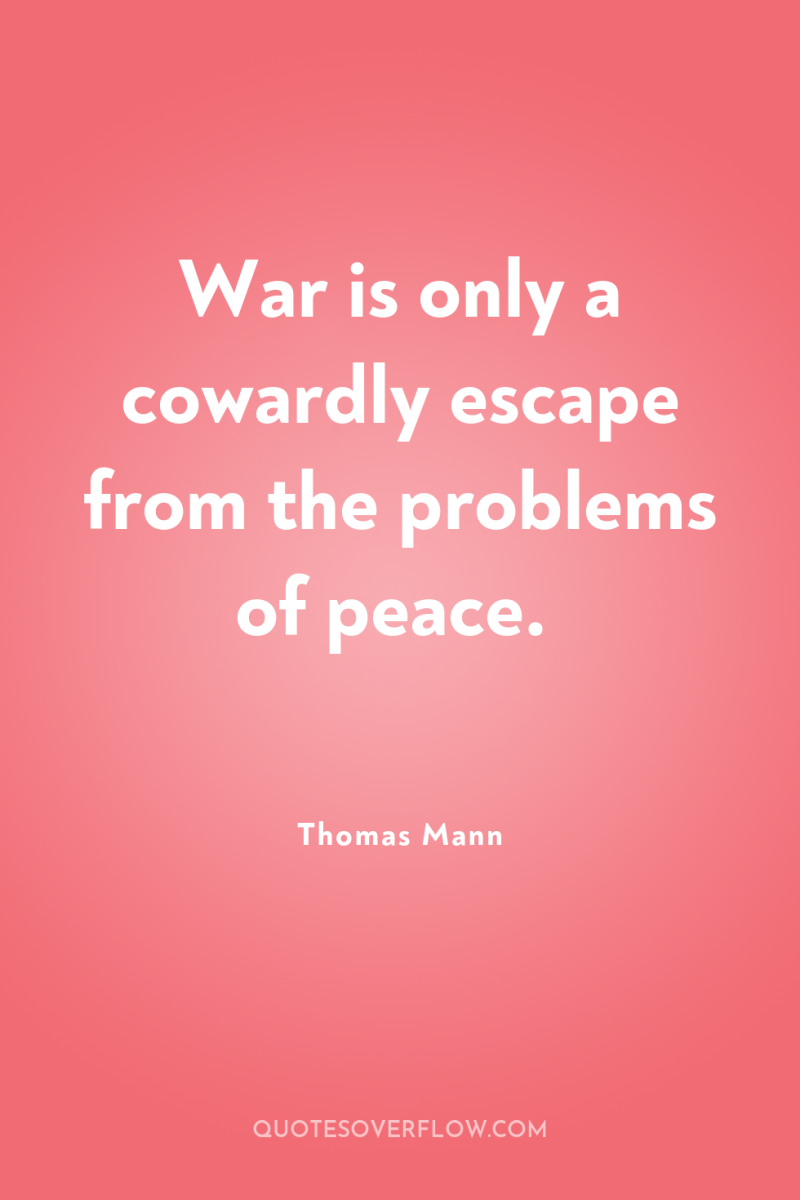
14
War is only a cowardly escape from the problems of peace.Thomas Mann
15
Naphta loathed the bourgeois state and its love of security. He found occasion to express this loathing one autumn afternoon when, as they were walking along the main street, it suddenly began to rain and, as if on command, there was an umbrella over every head. That was a symbol of cowardice and vulgar effeminacy, the end product of civilization. An incident like the sinking of the Titanic was atavistic, true, but its effect was most refreshing, it was the handwriting on the wall. Afterward, of course, came the hue and cry for more security in shipping. How pitiful, but such weak-willed humanitarianism squared very nicely with the wolfish cruelty and villainy of slaughter on the economic battlefield known as the bourgeois state. War, war ! He was all for it — the universal lust for war seemed quite honorable in comparison. .Thomas Mann
16
We are the bourgeoisie–the third estate, as they call us now–and what we want is a nobility of merit, nothing more. We don't recognize this lazy nobility we now have, we reject our present class hierarchy. We want all men to be free and equal, for no one to be someone else's subject, but for all to be subject to the law. There should be an end of privileges and arbitrary power. Everyone should be treated equally as a child of the state, and just as there are no longer any middlemen between the layman and his God, so each citizen should stand in direct relation to the state. We want freedom of the press, of employment, of commerce. We want all men to compete without any special privileges, and the only crown should be the crown of merit. .Thomas Mann
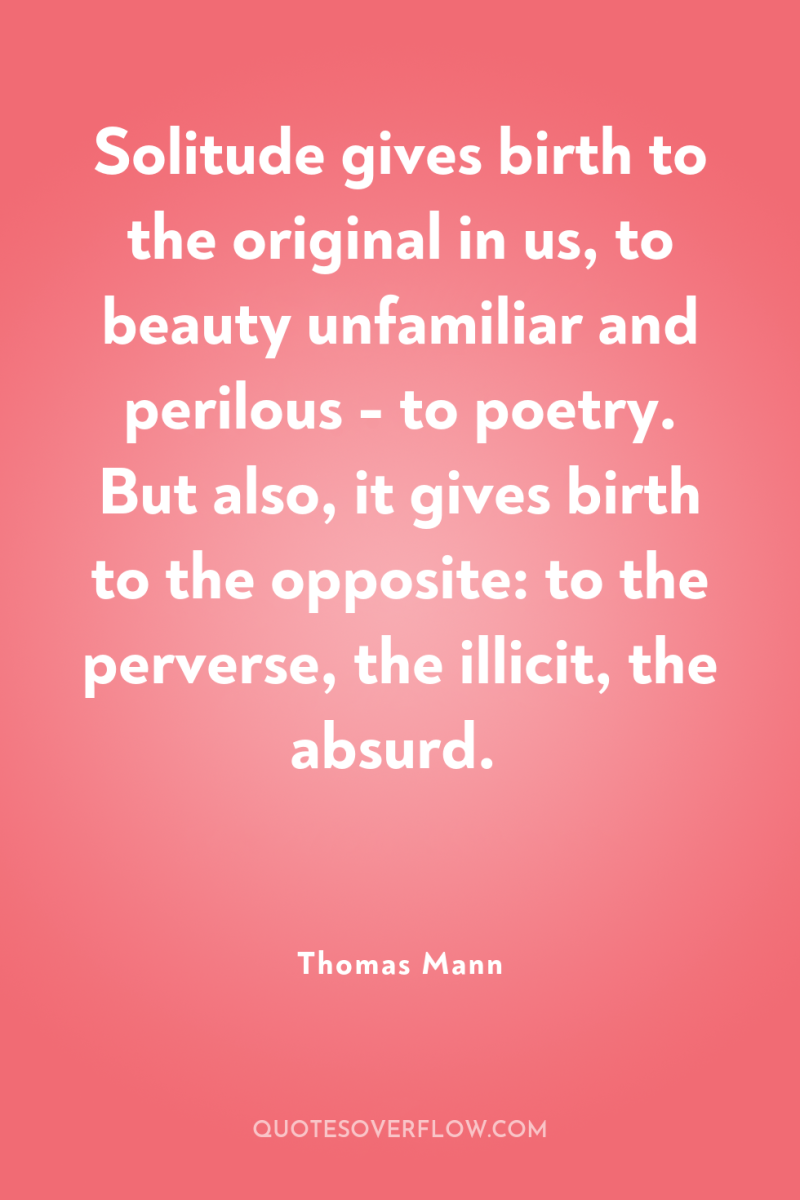
17
Solitude gives birth to the original in us, to beauty unfamiliar and perilous - to poetry. But also, it gives birth to the opposite: to the perverse, the illicit, the absurd.Thomas Mann
18
There were profound reasons for his attachment to the sea: he loved it because as a hardworking artist he needed rest, needed to escape from the demanding complexity of phenomena and lie hidden on the bosom of the simple and tremendous; because of a forbidden longing deep within him that ran quite contrary to his life's task and was for that very reason seductive, a longing for the unarticulated and immeasurable, for eternity, for nothingness. To rest in the arms of perfection is the desire of any man intent upon creating excellence; and is not nothingness a form of perfection? .Thomas Mann
19
Even in a personal sense, after all, art is an intensified life. By art one is more deeply satisfied and more rapidly used up. It engraves on the countenance of its servant the traces of imaginary and intellectual adventures, and even if he has outwardly existed in cloistral tranquility, it leads in the long term to overfastidiousness, over-refinement, nervous fatigue and overstimulation, such as can seldom result from a life of the most extravagant passions and pleasures.Thomas Mann
20
What did one see if one looked in any depth into the world of this writer's fiction? Elegant self-control concealing from the world's eyes until the very last moment a state of inner disintegration and biological decay; sallow ugliness, sensuously marred and worsted, which nevertheless is able to fan its smouldering concupiscence to a pallid impotence, which from the glowing depths of the spirit draws strength to cast down a whole proud people at the foot of the Cross and set its own foot upon them as well; gracious poise and composure in the empty austere service of form; the false, dangerous life of the born deceiver, his ambition and his art which lead so soon to exhaustion --- .Thomas Mann
21
He loved the sea for deep-seated reasons: the hardworking artist's need for repose, the desire to take shelter from the demanding diversity of phenomena in the bosom of boundless simplicity, a propensity–proscribed and diametrically opposed to his mission in life and for that very reason seductive–a propensity for the unarticulated, the immoderate, the eternal, for nothingness. To repose in perfection is the desire of all those who strive for excellence, and is not nothingness a form of perfection? .Thomas Mann
22
The books and magazines streamed in. He could buy them all, they piled up around him and even while he read, the number of those still to be read disturbed him. … they stood in rows, weighing down his life like a possession which he did not succeed in subordinating to his personality.Thomas Mann
23
Is not the pastness of the past the more profound, the more legendary, the more immediately it falls before the present ?Thomas Mann
24
Deep is the well of the past. Should we not call it bottomless?Thomas Mann
25
He completely lacked any ardent interest that might have occupied his mind. His interior life was impoverished, had undergone a deterioration so severe that it was like the almost constant burden of some vague grief. And bound up with it all was an implacable sense of personal duty and the grim determination to present himself at his best, to conceal his frailties by any means possible, and to keep up appearances. It had all contributed to making his existence what it was: artificial, self-conscious, and forced–until every word, every gesture, the slightest deed in the presence of others had become a taxing and grueling part in a play. .Thomas Mann
26
Space, like time, engenders forgetfulness; but it does so by setting us bodily free from our surroundings and giving us back our primitive, unattached state ... Time, we say, is Lethe; but change of air is a similar draught, and, if it works less thoroughly, does so more quickly.Thomas Mann
27
To be young means to be original, to have remained nearer to the sources of life: it means to be able to stand up and shake off the fetters of an outlived civilization, to dare -- where others lack the courage-- to plunge again into the elemental.Thomas Mann
28
For passion, like crime does not sit well with the sure order and even course of everyday life. It welcomes every loosening of the social fabric, every confusion and affliction visited upon the world, for passion sees in such a disorder a vague hope of finding advantage for itself.Thomas Mann
29
Or was he merely a mollycoddled favorite, enjoying capriciously prejudiced love? Schenback was inclined to believe the latter. Inborn in nearly every artist’s nature is a voluptuous, treacherous tendency to accept the injustice if it creates beauty and to grant sympathy and homage to aristocratic preferences.Thomas Mann
30
Innate in nearly every artistic nature is a wanton, treacherous penchant for accepting injustice when it creates beauty and showing sympathy for and paying homage to aristocratic privilege.Thomas Mann
31
This old, folkish layer survives in us all, and to speak as I really think, I do not consider religion the most adequate means of keeping it under lock and key. For that, literature alone avails, humanistic science, the ideal of the free and beautiful human being.Thomas Mann
32
Prayers and love are learned in the hour when prayer has become impossible and your heart has turned to stone.Thomas Mann
33
Passionate–that means to live for the sake of living. But one knows that you all live for sake of experience. Passion, that is self-forgetfulness. But what you all want is self-enrichment.Thomas Mann
34
His games have a deeper meaning and fascination that adults can no longer fathom and require nothing more than three pebbles, or a piece of wood with a dandelion helmet, perhaps; but above all they require only the pure, strong, passionate, chaste, still-untroubled fantasy of those happy years when life still hesitates to touch us, when neither duty nor guilt dares lay a hand upon us, when we are allowed to see, hear, laugh, wonder, and dream without the world's demanding anything in return, when the impatience of those whom we want so much to love has not yet begun to torment us for evidence, some early token, that we will diligently fulfill our duties. Ah, it will not be long, and all that will rain down upon us in overwhelming, raw power, will assault us, stretch us, cramp us, drill us, corrupt us.Thomas Mann
35
Travelers prove their lack of education if they make fun of the customs and values of their hosts, and the qualities that do a person honour are many and varied.Thomas Mann
36
A lonely, quiet person has observations and experiences that are at once both more indistinct and more penetrating than those of one more gregarious; his thoughts are weightier, stranger, and never without a tinge of sadness. Loneliness fosters that which is original, daringly and bewilderingly beautiful, poetic. But loneliness also fosters that which is perverse, incongruous, absurd, forbidden. .Thomas Mann
37
At thirty a man steps out of the darkness and wasteland of preparation into active life it is the time to show oneself, the time of fulfillment.Thomas Mann
38
Disease was a perverse, a dissolute form of life. And life? Life itself? Was it perhaps only an infection, a sickening of matter? Was that which one might call the original procreation of matter only a disease, a growth produced by morbid stimulation of the immaterial? The first step toward evil, toward desire and death, was taken precisely then, when there took place that first increase in the density of the spiritual, that pathologically luxuriant morbid growth, produced by the irritant of some unknown infiltration; this, in part pleasurable, in part a motion of self-defence, was the primeval stage of matter, the transition from the insubstantial to the substance. This was the Fall. The second creation, the birth of the organic out of the inorganic, was only another fatal stage in the progress of the corporeal toward consciousness, just as disease in the organism was an intoxication, a heightening and unlicensed accentuation of its physical state; and life, life was nothing but the next step on the reckless path of the spirit dishonored; nothing but the automatic blush of matter roused to sensation and become receptive for that which awaked it. .Thomas Mann
39
Tolerance becomes a crime when applied to evil.Thomas Mann
40
Consciousness of self was an inherent function of matter once it was organized as life, and if that function was enhanced it turned against the organism that bore it, strove to fathom and explain the very phenomenon that produced it, a hope-filled and hopeless striving of life to comprehend itself, as if nature were rummaging to find itself in itself - ultimately to no avail, since nature cannot be reduced to comprehension, nor in the end can life listen to itself.Thomas Mann
41
A harmful truth is better than a useful lie.Thomas Mann
42
Who then was the orthodox, who the freethinker? Where lay the true position, the true state of man? Should he descend into the all-consuming all-equalizing chaos, that ascetic-libertine state; or should he take his stand on the "Critical-Subjective, " where empty bombast and a bourgeois strictness of morals contradicted each other? Ah, the principles and points of view constantly did that; it became so hard for Hans Castorp's civilian responsibility to distinguish between opposed positions, or even to keep the premises apart from each other and clear in his mind, that the temptation grew well-nigh irresistible to plunge head foremost into Naphtha's "morally chaotic All.Thomas Mann
43
I know I am talking nonsense, but I’d rather go rambling on, and partly expressing something I find it difficult to express, than to keep on transmitting faultless platitudes.Thomas Mann
44
Cases of typhoid take the following course: When the fever is at its height, life calls out to the patient: calls out to him as he wanders in his distant dream, and summons him in no uncertain voice. The harsh, imperious call reaches the spirit on that remote path that leads into the shadows, the coolness and peace. He hears the call of life, the clear, fresh, mocking summons to return to that distant scene which he had already left so far behind him, and already forgotten. And there may well up in him something like a feeling of same for a neglected duty; a sense of renewed energy, courage, and hope; he may recognize a bond existing still between him and that stirring, colourful, callous existence which he thought he had left so far behind him. Then, how far he may have wandered on his distant path, he will turn back--and live. But if he shudders when he hears life's voice, if the memory of that vanished scene and the sound of that lusty summons make him shake his head, make him put out his hand to ward off as he flies forward in the way of escape that has opened to him--then it is clear that the patient will die." Buddenbrooks .Thomas Mann
45
Hidden away amongst Aschenbach’s writing was a passage directly asserting that nearly all the great things that exist owe their existence to a defiant despite: it is despite grief and anguish, despite poverty, loneliness, bodily weakness, vice and passion and a thousand inhibitions, that they have come into being at all. But this was more than an observation, it was an experience, it was positively the formula of his life and his fame, the key to his work.Thomas Mann
46
Solitude produces originality, bold and astonishing beauty, poetry. But solitude also produces perverseness, the disproportianate, the absurd and the forbidden.Thomas Mann
47
A solitary, unused to speaking of what he sees and feels, has mental experiences which are at once more intense and less articulate than those of a gregarious man. They are sluggish, yet more wayward, and never without a melancholy tinge. Sights and impressions which others brush aside with a glance, a light comment, a smile, occupy him more than their due; they sink silently in, they take on meaning, they become experience, emotion, adventure. Solitude gives birth to the original in us, to beauty unfamiliar and perilous - to poetry. But also, it gives birth to the opposite: to the perverse, the illicit, the absurd.Thomas Mann
48
The observations and encounters of a man of solitude and few words are at once more nebulous and more intense than those of a gregarious man, his thoughts more ponderable, more bizarre and never without a hint of sadness. Images and perceptions that might easily be dismissed with a glance, a laugh, an exchange of opinions occupy him unduly; they are heightened in the silence, gain in significance, turn into experience, adventure, emotion. Solitude begets originality, bold and disconcerting beauty, poetry. But solitude can also beget perversity, disparity, the absurd and the forbidden. .Thomas Mann
49
Discussions should always be held just before going to bed, your rear protected by sleep. How painful, after an intellectual conversation, to have to go about with your mind so stirred up.Thomas Mann
50
For a brief moment I felt I was the older, the more mature." A gift of life, " I responded, "if not to say, a gift of God, such as music, should not have the mocking charge of paradox leveled at it for things that are merely evidence of the fullness of its nature. One should love them."" Do you believe love is the strongest emotion?" he asked." Do you know any stronger?"" Yes, interest."" By which you probably mean a love that has been deprived of its animal warmth, is that it?"" Let's agree on that definition! " he said with a laugh. "Good night! " We had arrived again at the Leverkühn house, and he opened his front door.Thomas Mann
51
The sweet spot is where duty and delight converge.Thomas Mann
52
Order and simplification are the first steps towards mastery of a subjectThomas Mann
53
How can I free myself from sexuality? Eat nothing but rice?Thomas Mann
54
Opinions cannot survive if one has no chance to fight for them.Thomas Mann
55
Kindly permit me to tell you, sir, that I hate you. I hate you and your child, as I hate the life of which you are the representative: cheap, ridiculous, but yet triumphant life, the everlasting antipodes and deadly enemy of beauty. I cannot say I despise you - for I am honest. You are stronger than I. I have no armour for the struggle between us, I have only the Word, avenging weapon of the weak. Today I have availed myself of this weapon. This letter is nothing but an act of revenge - you see how honourable I am - and if any word of mine is sharp and bright and beautiful enough to strike home, to make you feel the presence of a power you do not know, to shake even a minute your robust equilibrium, I shall rejoice indeed. - .Thomas Mann
56
For the sake of goodness and love, man shall grant death no dominion over his thoughts.Thomas Mann
57
I bear within me the seed, the rudiments, the possibility of life's capacities and endeavors. Where might I be, if I were not here? Who, what, how could I be, if I were not me, if this outward appearance that is me did not encase me, separating my consciousness from that of others who are not me? An organism–a blind, rash, pitiful eruption of the insistent assertion of the will. Far better, really, if that will were to drift free in a night without time or space, than to languish in a prison cell lit only by the flickering, uncertain flame of the intellect.Thomas Mann
58
Perfectionism, of course, was something which even as a young man he had come to see as the innermost essence of talent.Thomas Mann
59
There are so many different kinds of stupidity, and cleverness is one of the worst.Thomas Mann
60
The accouterments of life were so rich and varied, so elaborated, that almost no place at all was left for life itself. Each and every accessory was so costly and beautiful that it had an existence above and beyond the purpose it was meant to serve — confusing the observer and absorbing attention.Thomas Mann
61
They walked, and the long waves rolled and murmured rhythmically beside them; the fresh salty wind blew free and unobstructed in their faces, wrapped itself around their ears, and made them feel slightly numb and deliciously dizzy. They walked along in that wide, peaceful, whispering hush of the sea that gives every sound, near or far, some mysterious importance.Thomas Mann
62
What they, in their innocence, cannot comprehend is that a properly constituted, healthy, decent man never writes, acts, or composes.Thomas Mann
63
I tell them that if they will occupy themselves with the study of mathematics they will find in it the best remedy against the lusts of the flesh.Thomas Mann
64
The perishableness of life...imparts value, dignity, interest to life.Thomas Mann
65
One could say that someone who does nothing but wait is like a glutton whose digestive system processes great masses of food without extracting any useful nourishment. One could go further and say that just as undigested food does not strengthen a man, time spent in waiting does not age him.Thomas Mann
66
But the boredom of Frau Spatz had by now reached that pitch where it distorts the countenance of man, makes the eyes protrude from the head, and lends the features a corpselike and terrifying aspect. More than that, this music acted on the nerves that controlled her digestion, producing in her dyspeptic organism such malaise that she was really afraid she would have an attack.Thomas Mann
67
But even those five-and-forty minutes were too long, the bored me --and boredom is the coldest thing in the world.Thomas Mann
68
[Men] act in response to an outward situation, and on being presented with an opportunity to conform to a pattern. If the pattern gives licence to cruelty, so much the better. They take advantage of the licence so thoughtlessly, so thoroughly, that it becomes perfectly clear: the generality of mankind are only waiting for the chance, only waiting for outward circumstance to sanction brutality and allow them to be cruel and brutal to their heart's content.Thomas Mann
69
Speech is civilization itself.Thomas Mann
70
A man's dying is more the survivors' affair than his own.Thomas Mann
71
Time cools time clarifies no mood can be maintained quite unaltered through the course of hours.Thomas Mann
72
Habituation is a falling asleep or fatiguing of the sense of time which explains why young years pass slowly while later life flings itself faster and faster upon its course.Thomas Mann
73
If you are possessed by an idea you find it expressed everywhere you even smell it.Thomas Mann
74
It is love not reason that is stronger than death.Thomas Mann
75
He who loves the more is the inferior and must suffer.Thomas Mann
76
A human being who is first of all an invalid is all body therein lies his inhumanity and his debasement.Thomas Mann
77
Human reason needs only to will more strongly than fate and she is fate.Thomas Mann
78
What the collective age wants allows and approves is the perpetual holiday from the self.Thomas Mann
79
No man remains quite what he was when he recognizes himself.Thomas Mann
80
Speech is civilization itself. The word even the most contradictory word preserves contact - it is silence which isolates.Thomas Mann
81
There is only one real misfortune: to forfeit one's own good opinion of oneself. Lose your complacency, once betray your own self-contempt and the world will unhesitatingly endorse it.Thomas Mann
82
It is a strange fact that freedom and equality, the two basic ideas of democracy, are to some extent contradictory. Logically considered, freedom and equality are mutually exclusive, just as society and the individual are mutually exclusive.Thomas Mann
83
For to be poised against fatality, to meet adverse conditions gracefully, is more than simple endurance; it is an act of aggression, a positive triumph.Thomas Mann
84
For I must tell you that we artists cannot tread the path of Beauty without Eros keeping company with us and appointing himself as our guide.Thomas Mann
85
Everything is politics.Thomas Mann